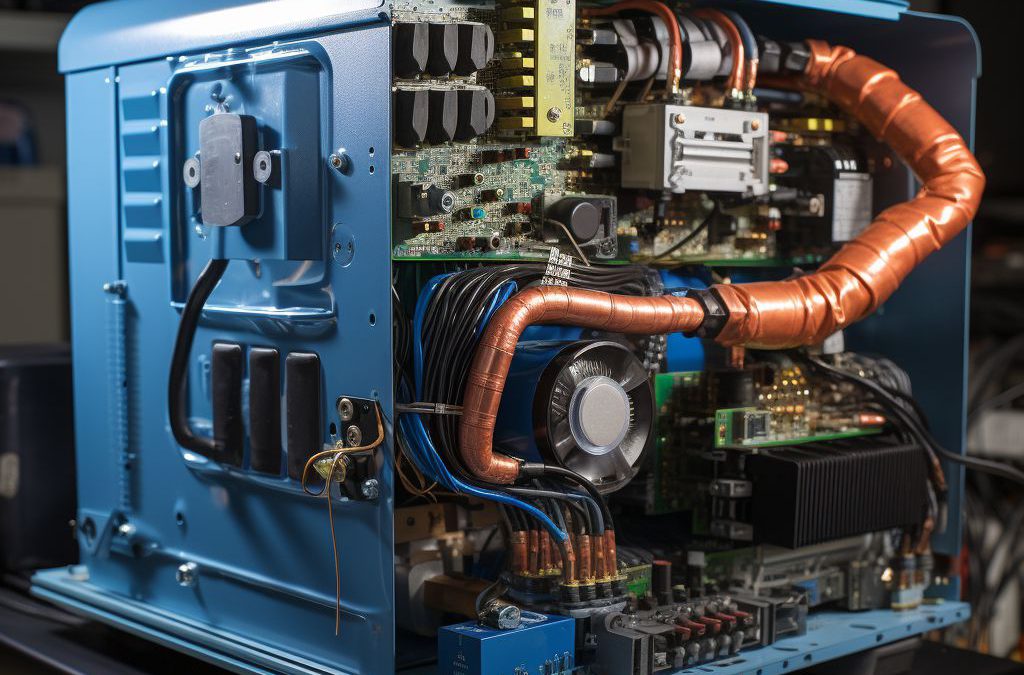Your AC is one of the most important appliances in your home, especially during scorching summers. But what happens when it blows warm air instead of cold? One of the potential culprits of AC failure is a refrigerant leak. It means that your AC is unable to circulate cool air because of the low refrigerant levels. Not only is this issue uncomfortable, but it can also potentially damage your system. In this article, we will explore the seriousness of refrigerant leaks and what you should do if you suspect one.
Tabe of Contents
- 1. Understanding the Risks of Refrigerant Leaks for Your Health and Safety
- 2. Signs and Symptoms of Refrigerant Leaks in Your HVAC System
- 3. The Environmental Impact of Refrigerant Leaks and How to Prevent Them
- 4. Repair or Replace? What to Do When You Discover a Refrigerant Leak
- 5. Professional Refrigerant Leak Detection and Repair: Why It’s Important and How It Can Save You Money
- 5. Professional Refrigerant Leak Detection and Repair: Why It’s Important and How It Can Save You Money
- People Also Ask
- Conclusion
1. Understanding the Risks of Refrigerant Leaks for Your Health and Safety
Refrigerant leaks are a serious concern both for your health and safety as well as for the environment. Refrigerants are chemicals that are used in HVAC systems to cool and condition the air. These chemicals are harmful to humans and the environment if they leak out of the HVAC system.
The most common type of refrigerant used in HVAC systems is known as Freon or R-22. Freon is a chlorofluorocarbon (CFC) which has been linked to the depletion of the ozone layer and global warming potential. When Freon leaks out of the HVAC system, it can cause health hazards such as headaches, nausea, dizziness, and respiratory problems. In some cases, it can even cause asphyxiation, which can be fatal.
Furthermore, refrigerant leaks can also pose fire hazards. Refrigerants are highly flammable, and when they come into contact with heat or electrical sparks, they can combust and create fires. This can result in serious property damage and put your safety at risk.
If you suspect a refrigerant leak in your HVAC system, it’s essential to take immediate action. It’s best to turn off your AC unit and contact a professional HVAC technician for an inspection. They can identify the source of the leak and take appropriate measures to fix it.
To sum up, refrigerant leaks are a serious issue that should be handled with utmost care. Not only do they pose health and safety concerns, but they also have adverse effects on the environment. It is always recommended to opt for professional services to detect and fix any refrigerant leaks, avoid potential damages and ensure safety.
2. Signs and Symptoms of Refrigerant Leaks in Your HVAC System
Refrigerant leaks in an HVAC system can pose a serious problem if not detected and repaired in a timely manner. Refrigerant, which helps transfer heat, can escape through cracks or holes in the tubing, coils, or compressor, resulting in decreased efficiency and performance of your air conditioning system. Below are some signs and symptoms of a refrigerant leak that homeowners should be aware of.
2.1 Weak or Warm Airflow
If the air coming from your AC unit is weak, warm, or varying in temperature, it could be a sign that the refrigerant levels are low. The refrigerant needs to be at a specific level to extract heat from your home effectively, so when the levels drop, it may take longer for your system to cool your space.
2.2 Increased Energy Bills
Another noticeable sign of a refrigerant leak is an increase in your energy bills, as the AC system will have to work harder to cool the space to the desired temperature. When there is not enough refrigerant, the AC system has to run longer to reach the desired temperature and maintain it, resulting in a higher energy bill.
2.3 Hissing Sounds and Foul Odors
If you hear hissing sounds coming from your AC unit, it could mean that refrigerant is escaping from a leak. Refrigerant has a pungent odor, and a noticeable smell means that the refrigerant has leaked into your living space. If you smell something funky like sulfur or even like nail polish, you may want to call an HVAC technician and get the leak checked out.
It is important to address refrigerant leaks promptly to reduce the risk of system failure, high energy bills, and harmful effects on the environment. If you notice any of these signs or symptoms, contact a professional HVAC technician to inspect, detect and repair the refrigerant leak.
3. The Environmental Impact of Refrigerant Leaks and How to Prevent Them
Refrigerants are chemicals used in cooling systems to regulate temperature and absorb heat. When they leak from an HVAC system, they can have a detrimental effect on the environment. Refrigerant leaks in residential or commercial settings can harm the ozone layer and contribute to global warming by releasing greenhouse gases into the atmosphere.
When refrigerants leak out of an AC unit, they can impact the environment through the discharge of harmful compounds like chlorofluorocarbons (CFCs), hydrochlorofluorocarbons (HCFCs), and hydrofluorocarbons (HFCs). These compounds can be harmful to both plant and animal life, and contribute to air and water pollution.
Fortunately, there are ways to prevent refrigerant leaks and reduce their impact on the environment. Regular maintenance of your HVAC system can help prevent leaks by identifying potential problems early on. Additionally, routine system checks and inspections can help ensure your system is operating efficiently and safely, reducing the risk of leaks.
It is also important to properly dispose of old refrigerant and use only eco-friendly refrigerants in your HVAC system. When disposing of refrigerants, it is important to use a certified technician to properly handle and dispose of the chemicals in accordance with state and federal regulations.
In summary, while refrigerant leaks may seem like a small issue, they have major impacts on the environment. By taking preventative measures and properly disposing of chemicals, we can minimize the negative impact of these leaks. It is essential to prioritize environmental sustainability and protect the planet for future generations.
4. Repair or Replace? What to Do When You Discover a Refrigerant Leak
When you discover a refrigerant leak in your HVAC system, you may wonder whether you should repair or replace the system. The answer depends on several factors, including the age and condition of your system, the severity of the leak, and your budget.
Repair or Replace?
If your system is relatively new and the leak is small and easy to repair, repairing the system may be the best option. However, if your system is old and the leak is significant, it may be more cost-effective to replace the system. It’s important to consult with a professional HVAC technician to determine the best course of action.
Factors to Consider When Deciding Whether to Repair or Replace
– Age of the system: If your system is more than 10-15 years old, it may be more cost-effective to replace it instead of repairing it.
– Extent of the leak: If the leak is minor, it may be possible to repair it without too much expense. However, if the leak is significant, repairing the system could be costly, and it may be more economical to replace the system.
– Overall condition of the system: If your system is in good overall condition, repairing it may be a good option. However, if your system has other significant issues, replacing it may be a better investment.
– Energy efficiency: If your system is old and inefficient, replacing it with a newer and more energy-efficient system could save you money in the long run.
Conclusion
When you discover a refrigerant leak in your HVAC system, it’s important to take action promptly to prevent further damage. Whether you decide to repair or replace your system, it’s essential to work with a professional HVAC technician who can help you make an informed decision and ensure that the work is done correctly.
5. Professional Refrigerant Leak Detection and Repair: Why It’s Important and How It Can Save You Money
5. Professional Refrigerant Leak Detection and Repair: Why It’s Important and How It Can Save You Money
When you suspect a refrigerant leak, it’s essential to have a professional technician conduct leak detection and repair. Professional assistance can help prevent more significant issues that could lead to expensive repairs and replacements. Here are the top reasons why professional refrigerant leak detection and repair are essential:
1. Proper diagnosis and repair:
Professional technicians have ample experience and knowledge to detect the exact location of the refrigerant leak. They use advanced equipment and techniques like ultrasonic leak detectors to identify even small leaks that are not visible with naked eyes. Once they identify the leak, they repair it using appropriate techniques and materials to prevent future leaks and ensure your HVAC system runs optimally.
2. Money-Saving:
Refrigerant leaks cost you money in two ways. First, a refrigerant leak can cause your energy bills to go up since it makes your HVAC system less efficient. Second, if not dealt with, small refrigerant leaks can escalate into significant issues that require costly repairs and replacements. A professional refrigerant leak detection and repair can save you money in the long run, preventing costly emergencies and restoring your system’s efficiency.
3. Adherence to environmental regulations:
Professional technicians are well-versed with the environmental regulations surrounding refrigerant use and disposal. They ensure that they handle and dispose of refrigerants responsibly to protect the environment and prevent fines and penalties that may arise from non-compliance. Furthermore, they inform you of the latest regulations regarding refrigerant and HVAC systems, making you knowledgeable and compliant with the law.
Conclusively, professional refrigerant leak detection and repair are crucial to preventing significant issues that can cause you money, inconvenience, and fines. Don’t hesitate to contact a professional technician when you suspect a refrigerant leak, protect your HVAC system, your health, and the environment.
People Also Ask
What are the signs of a refrigerant leak?
Signs of a refrigerant leak include reduced cooling power, higher electricity bills, unusual hissing or bubbling sounds, ice buildup on the evaporator, and the presence of oil stains or wet spots around the air conditioner.
What happens if you breathe in refrigerant?
Breathing in refrigerant vapors can cause respiratory distress, coughing, wheezing, suffocation, fainting, and even death in extremely rare cases. It can also cause skin, eye and throat irritation and chemical burns.
Can a refrigerant leak cause a fire?
A refrigerant leak can cause a fire if the refrigerant comes into contact with an open flame or a heat source, emitting toxic fumes that can ignite and cause an explosion.
How long does a refrigerant leak take to repair?
The time it takes to repair a refrigerant leak depends on the size and location of the leak. Small leaks can be fixed within a few hours but more significant damages might require several days to detect and repair.
Why is it important to fix a refrigerant leak?
Aside from wasting energy and significantly increasing electricity bills, leaking refrigerants are hazardous to the environment, and contribute to climate change by diminishing the ozone layer.
Conclusion
In conclusion, refrigerant leaks can be serious and can cause damage to health and the environment if not handled properly. To prevent accidents and reduce negative impacts, it is crucial to schedule regular air conditioning maintenance that can help detect and repair refrigerant leaks early on.

AC Replacement Specialist
Wyatt specializes in managing the replacement process for older or malfunctioning units. His focus on seamless transitions ensures minimal disruption during upgrades.

